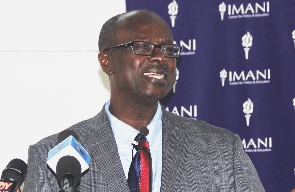 Prof. Kweku Asare is a US-based legal practitioner
Prof. Kweku Asare is a US-based legal practitioner
US-based Ghanaian legal practitioner, Professor Kwaku Asare, popularly known as Prof. Azar is hitting back at critics who are castigating Auditor General, Daniel Domelevo over what they say is his failure to verify names provided by GETFund as beneficiaries of the scholarship scheme.
Analysing the situation, using the recent Airbus-saga as an example, Prof. Azar said Mr. Domelevo did nothing wrong considering there were similar situations where the UK's Serious Fraud Office provided documents, implicating some persons in countries including Ghana.
According to him,
“The Auditor-General did not have to contact GB81 (GETFund Beneficiaries) for the same reason that the UK SFO (UK's Serious Fraud Office) did not have to contact GO1 (Government Official 1).”
In addition, he believes the Special Prosecutor, Martin Amidu cannot overlook the GETFund issue while giving attention to that of the Airbus.
“You cannot praise the UK SFO while condemning the Ghana AG. Nor can the Special Prosecutor act on the UK SFO report while being wilfully blind to the Ghana AG GETFund Compliance Audit.” He noted.
Defending Mr. Domelevo, Prof. Azar said “there is nothing wrong with the AG publishing the list of GB (GETFund Beneficiaries). This list should be on GETFund’s website to start with. But this is Ghana.” he wrote in a Facebook post.
GETFund
An audit released by the Ghana Education Trust Fund (GETFUND) Scholarship scheme for the period 2012 to 2018, named some government appointees as beneficiaries of the fund set aside majorly for needy but brilliant students.
The performance audit report cited some personalities including lecturers, media practitioners and heads of institutions as having profited from the funds.
Many including some journalists, lecturers, and politicians, have since emerged to deny having benefitted from the funds as indicated by the report, demanding for a retraction of their names and threatening lawsuits in some cases, against Mr. Domelevo.
On the back of that, some critics believe Mr. Domelevo acted rather irresponsibly by just accepting the list provided by GETFund as final truth, without scrutinising the documents and verifying them against the bank statements provided.
Read the post below:
Airbus Saga
It will be recalled that Airbus, a company noted for the manufacturing of Aircrafts, said it had paid bribe in Ghana and some other African countries between 2011 and 2015.
This was revealed in a corruption investigation of business deals Airbus has been involved in for the past 10 years.
UK-based Newspaper, The Guardian, wring on the outcome of the UK’s Serious Fraud Office (SFO) investigation stated that “Allison Clare, for the SFO, told the court the company had paid bribes in Malaysia, Sri Lanka, Indonesia, Taiwan and Ghana between 2011 and 2015.”
A judgment from the Crown Court at Southwark, UK, last month said: “The fifth count alleges that contrary to section 7 of the Bribery Act 2010, between 1 July 2011 and 1 June 2015, Airbus SE failed to prevent persons associated with Airbus SE from bribing others concerned with the purchase of military transport aircraft by the government of Ghana, where the said bribery was intended to obtain or retain business or advantage in the conduct of business for Airbus SE. 53.
“Between 2009 and 2015, an Airbus defence company engaged Intermediary 5, a close relative of a high-ranking elected Ghanaian government official (Government Official 1) as its BP in respect of the proposed sale of three military transport aircraft to the government of Ghana.
“A number of Airbus employees knew that Intermediary 5 was a close relative of Government Official 1, who was a key decision-maker in respect of the proposed sales. A number of Airbus employees made or promised success-based commission payments of approximately €5 million to Intermediary 5.
“False documentation was created by or with the agreement of Airbus employees in order to support and disguise these payments. The payments were intended to induce or reward ‘improper favour’ by Government Official 1 toward Airbus. Payments were eventually stopped due to the arrangement failing the due diligence processes required by the Liquidation Committee.”